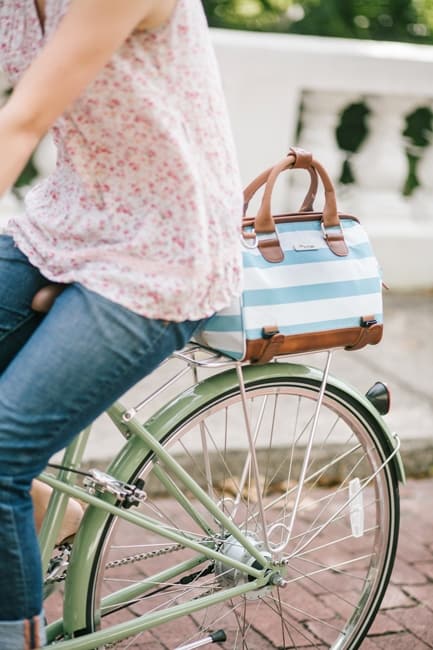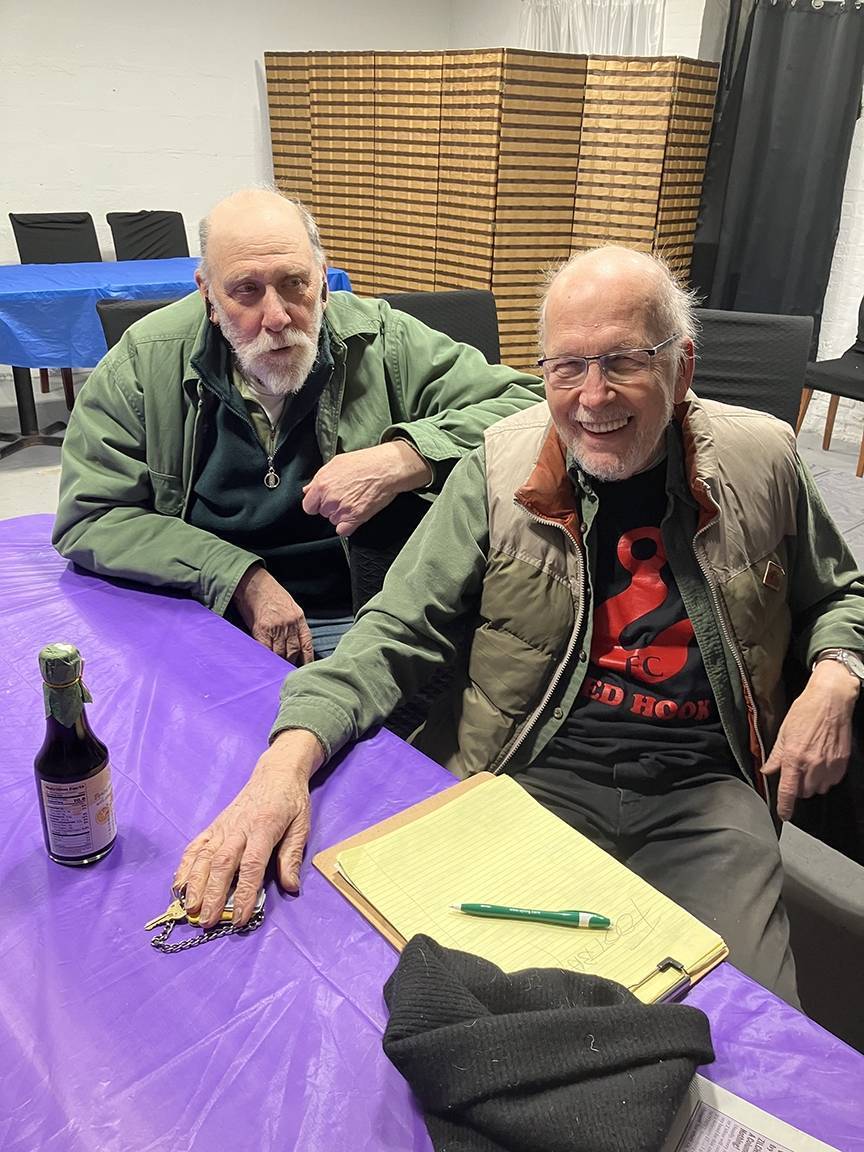Industrial designer Maria Boustead thought of the idea for a functional and versatile bicycle bag back in 2009 when she couldn’t find one that was both bike-compatible for her work commutes and stylish enough to take into her office. Backpacks made her back too sweaty, and shoulder bags would swing around and annoyingly fall down her arm while she rode; plus, traditional bike bags were big, clunky and not intended to be carried off the bike. “Why hasn’t any company thought to do this yet?” she wondered, and then decided to solve the problem herself.
“I was seeing how more and more people were biking for transportation all the time, especially in cities across the country that were putting in more bike lanes and bike-sharing,” Boustead said. “It seemed like a good opportunity to create a brand and products that addressed some kind of crossover with lifestyle.”
Since then, her Po Campo brand, which has its headquarters in Bushwick, has grown to be a celebration of the active urban lifestyle by offering bike, yoga and casual travel bags built for experiencing the richness of city life – and looking good while doing it. Boustead believes that you should be able to enjoy a bicycling lifestyle and the benefits of city cycling without having to compromise on either style or functionality.
It’s all in the details
She explained that originally she started thinking about all the different bike trips somebody might make and what he or she would carry on those different kinds of trips. So she narrowed the scenarios down to biking to work (having a bag that would work with the commute and would also look office appropriate) and going out at night for dinner or hanging out with friends (having a smaller bag that could hold the essentials). Boustead also felt the bike bags that were available in the market were boring, style-wise.
“Everything is black – and there’s nothing wrong with black – but it just looks so basic,” she said. “To me, biking is so fun and your little adventure every day and those feelings are not coming across in the design at all. We wanted to have something a little more expressive, joyful and fun available to people.”
 As a result, Po Campo bags are available in black and a variety of colorful prints and patterns. They’re made of weatherproof, vegan fabrics and feature practical details, such reflective accents for extra visibility at night, intuitively placed interior and exterior pockets and a place to clip on your bike light or set of keys. For example, a Po Campo bag, which has adjustable and secure velcro straps for placement on the bike itself, later converts into a crossbody or handheld bag to carry throughout the day.
As a result, Po Campo bags are available in black and a variety of colorful prints and patterns. They’re made of weatherproof, vegan fabrics and feature practical details, such reflective accents for extra visibility at night, intuitively placed interior and exterior pockets and a place to clip on your bike light or set of keys. For example, a Po Campo bag, which has adjustable and secure velcro straps for placement on the bike itself, later converts into a crossbody or handheld bag to carry throughout the day.
“All of the attachments kind of blend into the design of the bag,” she added. “In my design training, I remember one of my mentors said that [the object or product] has to work well and has to also be beautiful – and if you fail at one, then you didn’t do your job. That really stuck with me.”
A New York state of mind
According to the 2017 report on American Community Survey Data by the League of American Bicyclists, 1.3 percent of commuters (51,733 people) biked to work in NYC – a 169.9 percent increase between 2000 and 2017. City residents often have to lug their bicycles up and down flights of stairs to their apartments or don’t even have the space to store them at home. That’s why Boustead feels Citi Bike has really taken off here because cyclists don’t have to worry about dealing with those situations.
With that said, Po Campo was the first company to introduce a bag designed for bike share systems, including Citi Bike, Divvy in Chicago and Capital Bikeshare in Washington, D.C.
Po Campo describes their Unisex Bike Share Bag 2.0 thusly: “We designed the Bike Share Bag to secure into the weird front basket of bike share bikes, so you can carry what you need without worrying about stuff getting smashed by the bike’s super taut bungee or falling out of the basket all together.”
10-year milestone
 Over the last decade, Boustead and her team have learned how to make bags more efficient and to prioritize what features customers value more than others. And while the designs have changed, the heart of the product has pretty much remained the same.
Over the last decade, Boustead and her team have learned how to make bags more efficient and to prioritize what features customers value more than others. And while the designs have changed, the heart of the product has pretty much remained the same.
“[Reaching the 10th anniversary] feels amazing because I appreciate how far we’ve come. Definitely every business owner can say there are a lot of ups and downs; sometimes the downs are such dark periods that you say it’s just not worth it – but I’m so glad we stuck with it,” Boustead said. “It makes me very proud and I want to keep going for everybody else that needs a bag in their life.”
Moving forward, Po Campo will continue to keep micro-mobility trends in mind, thinking more about sustainability and supporting cyclists who bike in evolving urban environments.
All photos courtesy of Po Campo (Flickr)
Author
-

George Fiala has worked in radio, newspapers and direct marketing his whole life, except for when he was a vendor at Shea Stadium, pizza and cheesesteak maker in Lancaster, PA, and an occasional comic book dealer. He studied English and drinking in college, international relations at the New School, and in his spare time plays drums and fixes pinball machines.
View all posts
George Fiala has worked in radio, newspapers and direct marketing his whole life, except for when he was a vendor at Shea Stadium, pizza and cheesesteak maker in Lancaster, PA, and an occasional comic book dealer. He studied English and drinking in college, international relations at the New School, and in his spare time plays drums and fixes pinball machines.











